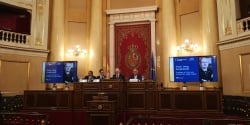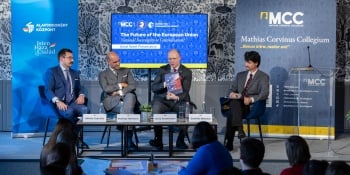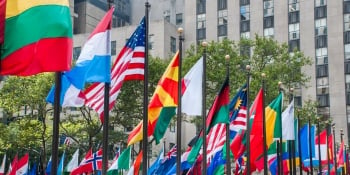Published: 06.12.2024

• On December 1-3, in the plenary hall of the Spanish Senate, members of the Political Network for Values from 45 countries, from the four continents bordering the Atlantic, met at the “VI Transatlantic Summit.” Among them were representatives of the Ordo Iuris Institute, which co-organized this unique event for the first time this year.
• The president of the Ordo Iuris Institute, attorney Jerzy Kwaśniewski, led a panel at the Summit entitled “Freedom of Expression and Religious Freedom, Pillars of Democracy.” Polish politicians from the Confederation (Konfederacja) and Law and Justice (Prawo i Sprawiedliwość) parties also participated, with Krzysztof Bosak and Krzysztof Szczucki taking part in panels on how to turn the tide toward a culture of life and on parental rights and education, respectively.
• In Madrid, Ordo Iuris representatives spoke with Political Network for Values partners about plans to promote in-depth cooperation in monitoring and coordinating resistance to the rise of “global governance”, ie. the extra-democratic leaching of states’ sovereignty by international institutions and tribunals. Ordo Iuris’ “Citizens Against Global Governance” project was met with great interest.
• The Ordo Iuris delegation also met with representatives of Foro Madrid, which was created four years ago by politicians from the Spanish-speaking world to oppose the action of the left, including of the communist left, in the framework of the Foro de São Paulo and Grupo de Puebla.
• At the Madrid Transatlantic Summit, members of the Political Network for Values defended the right to life from conception to natural death, the institution of marriage, the family, freedom, and the sovereignty of nations. At the end of the summit, they reaffirmed their commitment to their shared mission for the next ten years by signing the Madrid Commitment.
On December 1-3, the Ordo Iuris Institute was a partner and participant in the VI Transatlantic Summit of the organization Political Network for Values (PNfV). This year’s forum had the theme “For Freedom and a Culture of Life.” The Ordo Iuris Institute became a co-organizer of the event this year. It assembled more than 300 people from 45 countries, from both sides of the Atlantic. The Ordo Iuris president, attorney Jerzy Kwaśniewski, led a debate on “Freedom of Expression and Religious Freedom, Pillars of Democracy” during a session in the plenary hall of the Spanish Senate. The Ordo Iuris delegation held talks with partners from Europe, Africa, and the Americas about plans to coordinate the action of conservative actors in international institutions and tribunals.
Ordo Iuris Institute’s international project presented in Madrid
The Polish legal think-tank’s Citizens Against Global Governance project received considerable attention. Organizations such as the Political Network for Values, founded a decade ago, and the Foro Madrid, which has operated since 2020, seek to facilitate the exchange of information and coordination of efforts to promote the right to life from conception to natural death, the family, civil liberties, democracy, and the sovereignty of nations at the political and civil-society levels. Citizens Against Global Governance drew considerable interest because a similar initiative has thus far been lacking in the legal community. The project meets a need for monitoring and intervening where international organizations overstep their authority and usurp increasingly broad powers to exercise global governance, to the detriment of state sovereignty and the democratic control of citizens over the authorities. The initiative is especially timely since the September UN summit announced accelerated efforts to strengthen global governance. At the same time, disturbing processes are taking place in the operation of the WHO, where both the organization’s constitution and the World Health Regulations are being amended. No less important is the need to have extensive and increasing professional oversight of the operations of international human rights tribunals.
About the Transatlantic Summit of the Political Network for Values
The VI Transatlantic Summit, whose central part was a conference held on Monday, December 2, at the Spanish Senate, was dedicated to the themes of freedom and a culture of life. Previous summits of the Political Network for Values took place at UN headquarters in New York in 2014, at the European Parliament in Brussels in 2017, at the Congress of Colombia in 2019, in Budapest in 2022, and again in New York in 2023. Monday’s summit in Madrid was broadcast live on the Spanish Senate’s official channel, and all journalists who sought accreditation were welcomed. As the Political Network for Values website explains, the summit occurred thanks to the support of partner organizations. In addition to Poland’s Ordo Iuris Institute, these included the Heritage Foundation, Foundation for a Civic Hungary, Center for Fundamental Rights, International Organization for the Family, Family Watch International, Center for Family and Human Rights, Centro de Estudios, Formación y Análisis Social - CEU-CEFAS, Family Research Council, Fundación Neos, Talenting Group, and Más Cinco.
Delegates attended from Poland, Ukraine, Hungary, Bulgaria, Romania, Croatia, Austria, Belgium, Great Britain, France, Germany, Switzerland, Italy, Portugal, Spain, Canada, the United States, Mexico, Colombia, the Dominican Republic, Argentina, Brazil, Chile, Venezuela, Panama, Paraguay, Kenya, Morocco, Cameroon, Nigeria, Sierra Leone and Uganda, among others. From Poland, in addition to a delegation from the Ordo Iuris Institute, politicians from the Law and Justice party (Krzysztof Szczucki MP) and Confederation (Deputy Speaker of the Sejm Krzysztof Bosak and Anna Bryłka MEP) attended. The Hungarian delegation, which hosted the previous Transatlantic Summit, organized an evening reception on Sunday, December 1, at the Royal Theater. Bishop Joseph Mbatia, of Kenya, and Bishop Bernardito Auza, Apostolic Nuncio to Spain, concelebrated Mass to open the Summit’s main day in the beautiful Baroque Royal Monastery of the Incarnation (near the Senate complex). A small demonstration of pro-abortion activists tried unsuccessfully to disrupt the Holy Mass. Similarly, prior to the summit, a group of Spanish left-wing politicians, provoked by some left-wing newspapers (including the daily El País), tried unsuccessfully to have the summit canceled.
The Transatlantic Summit, organized by conservative circles from the four continents bordering the Atlantic, is an opportunity to meet, exchange views and information, and sometimes coordinate activities. Discussion panels held on December 2, in the plenary chamber of the upper house of the Spanish parliament, covered topics such as challenges to freedom in today’s democracies; turning the tide toward a civilization of life; the impact of a culture of life on demographics; mothers, children, and families at the heart of public policies; freedom of speech and religious freedom as pillars of democracy; freedom of education as a universal human right; and caring for life in its most vulnerable expressions (Summit program available here in English, and here in Spanish, with a full list of panelists).
Spanish senators and the outgoing president of the Political Network for Values, José Antonio Kast of Chile, opened the session. Kast has decided to devote himself to the upcoming election campaign in his country, where he is one of the favorites in next year’s presidential election. The new chairman of the Political Network for Values is the U.S.-born Croatian Stephen Bartulica, who is currently a member of the European Parliament sitting with the European Conservatives and Reformists (ECR) group.
“Our Transatlantic Summit is more than a meeting – it is a call to action,” said the new PNfV president. “Our Transatlantic Summit, more than a meeting, is a call to action. Speeches are not enough, we have to act in a global and increasingly articulate way so that the dignity of every human being is respected at all stages of his or her development,” MEP Bartulica added. “I encourage you to stand firm and persevere in defending what is good and true. Your example inspires people all over the world. We must fight in the arena of politics, but winning elections is not enough, it is culture that will ultimately determine the fate of our nations. Here we must not give an inch. We are called to win the hearts and minds of the next generation,” he said.
Monday’s proceedings closed with a group of young leaders reading the Madrid Commitment signed by members of the Political Network for Values.
Among those present at Madrid’s VI Transatlantic Summit were many members of parliament or representatives of organizations defending the right to life from conception to natural death, the family, national sovereignty, or simply Christian values. In addition, there were members of governments from countries such as Argentina, Italy, and Hungary, as well as people close to President-elect Donald Trump’s incoming administration.
Together in defense of true values
“When people talk about Javier Milei’s presidency, many talk about the economic side, but in reality, there is also a great culture war going on,” said Nahuel Sotelo, Secretary of Worship and Civilization of Argentina. “Countless resolutions are being voted on at the United Nations that talk about gender, abortion, or patriarchy, but don’t talk about the family. So, those of us who are here, those of us who are in politics, those of us who defend life, God, the nation, and the family, need to take an interest in what is happening. We must put pressure on our governments to know what is being voted on, and what international organizations are doing. Because it is out of ignorance that the left becomes strong. And if there is one thing they are good at, it is capturing all areas of power and leaving absolutely nothing behind.”
That is why the Ordo Iuris Institute for Legal Culture launched the Citizens Against Global Governance initiative in Madrid. The cooperation of a network of partners would guarantee not only a stronger presence in international institutions but the possibility of coordinating actions and supporting each other on issues of importance to all, which are decided in, among others, the European Court of Human Rights, the Inter-American Court of Human Rights or the African Court on Human and Peoples’ Rights.
Similarly, the Foro Madrid, which convenes politicians from Spain and Spanish-speaking Latin America, is a reaction to the coordinated, often secretive and anti-democratic activities of the left. This includes the communist left (comprising, but not limited to, Cuba and Venezuela) within the Foro de São Paulo and Grupo de Puebla, as well as the little-known but highly influential Progressive International, founded at the initiative of Bernie Sanders, an American socialist from the Democratic Party. Many members of Foro Madrid (“Madrid Forum”) also meet within the Political Network for Values. Although cooperation between conservative circles from different countries and continents is decades behind similar efforts on the left, a mood of optimism prevailed in Madrid among defenders of life, family, freedom, and national sovereignty from both sides of the Atlantic.
After the open part of the Atlantic Summit (which included Sunday’s welcome reception, where entry was not closely guarded), members of the Political Network for Values, including the Ordo Iuris delegation, attended a closed-door meeting on Tuesday, December 3, to talk away from cameras and journalists.
The Madrid Commitment
The Madrid Commitment, read by a group of young leaders after Monday’s day-long discussions, commits the signatories - which include Poland’s Ordo Iuris Institute for Legal Culture – to promote a specific agenda outlined in five points over the next ten years:
Worried about Poland
Finally, it is worth noting that representatives of the Ordo Iuris Institute and Polish politicians in opposition to the left-liberal government of Donald Tusk were frequently asked at the Madrid event about the attacks on the rule of law currently taking place in Poland. Many similarities were found in the anti-democratic and anti-freedom policies of at least part of the left on both sides of the Atlantic. This can only reinforce our belief in the need to reinforce international cooperation among advocates of life, family, freedom, national cultures, and the sovereignty of democratic states.

• Representatives of Ordo Iuris took part in the second round of consultations ahead of the 58th Session of the UN Commission on Population and Development (CPD58) on global health policy.


• The European Union’s Council Conclusions on EU Priorities in UN Human Rights Fora in 2025 identify key areas of EU human rights activities at UN fora and refers to several universal human rights, such as freedom from torture and freedom of religion or belief.

• Last week, experts from the Ordo Iuris Institute attended the 69th session of the UN Commission on the Status of Women (CSW) in New York, the largest global gathering of countries and organizations focused on women's rights.